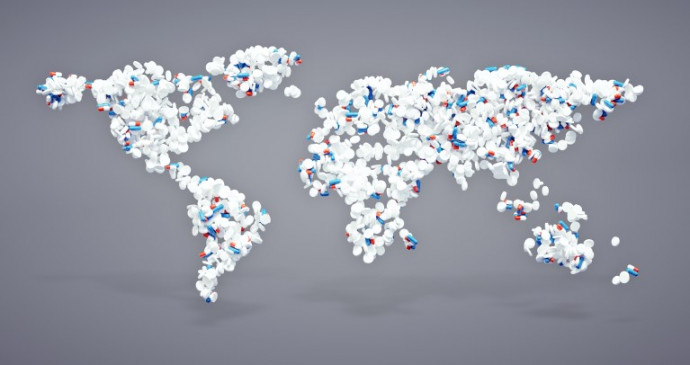News
Published 9 November 2017Reduce the overuse of antibiotics

Antimicrobial Resistance Week is 13-19 November 2017. Find out what you can do to help reduce the spread of antimicrobial resistance.
New Zealanders are not immune to the global rise in harmful bacteria becoming resistant to antibiotics, which can lead to serious and potentially fatal infections. These include infections we have considered minor like bronchitis, sinus, ear and urinary tract infections.
In light of the WHO's World Antibiotic Awareness Week, Royal Society Te Apārangi is encouraging Kiwis to reduce the overuse and misuse of antibiotics and antibacterial products.
Humans evolved to co-exist with trillions of microscopic bacteria on and within our bodies. Many bacteria are beneficial if not vital to our wellbeing, most are harmless. Other bacteria, however, can cause disease and can result in a variety of unpleasant if not dire infections.
Before antibiotics, there were no effective treatments for many of these infections (besides amputation), and human suffering caused by infections was common. But the discovery of antimicrobial drugs that can effectively treat infections caused by bacteria and a wide range of other microbes, was one of the greatest medical achievements of the 20th century and the resulting benefits to human society have been immeasurable.
Yet, we have been taking antibiotics for granted for too long.
Treating infections that have become resistant to the drugs we normally use takes longer, costs more and results in harsher side effects. Because fighting drug-resistant infections is more difficult, patients are more likely to have to stay in hospital to receive treatment rather than at home, and may require surgery to remove infected tissue.
Increasing antibiotic resistance in disease-producing bacteria has already resulted in some previously treatable infections becoming untreatable. People have died from infections caused by bacteria resistant to all available antibiotics.
Threats to human health in recent decades include the increasing spread of bacterial strains such as MRSA (methicillin-resistant Staphylococcus aureus) and CRE (carbapenem-resistant Enterobacteriaceae).
Although there is an urgent need to find new antibiotics as well as other means of treating infections, a lot of money and research is required before new treatments will become available. Therefore, in the here and now of our daily lives, we all need to start taking responsibility to make sure antibiotics will remain as effective as possible, for as long as possible.
- Wash your hands
No matter if you are a child or an adult, if you have been around potential sources of harmful bacteria – in the garden, around pets and animals, in the kitchen handling uncooked meat, fish, eggs, poultry, or unpasteurised dairy, or if you are sick or are around those who are sick, or if you've recently been to the toilet – you should wash your hands with regular soap to reduce the chance of either getting a bacterial infection or spreading one to others.
- Reduce your use of antibacterial products
Campaigns for cleanliness and hygiene have resulted in antibacterial compounds being added to cleaning products such as sprays, disinfectants, liquid soaps and toothpaste, but this is unnecessary and its aiding the growth of resistance by bacteria. It's still essential to maintain a good standard of personal hygiene and keep your pets and dwelling clean, but avoid using cleaning items that contain antibiotics or antifungals. Use regular soaps and disinfectants instead.
- Use antibiotics as prescribed
It's a common misconception that antibiotics can cure all general illnesses, particularly ones caused by viruses like colds and flu. They can't. However, when prescribed antibiotics, please follow the instructions of your health professional so you can maximise the benefit from taking them. Likewise, don't share these prescriptions with others as their illnesses may not be treated by them.
- Watch what you eat
As well as helping humans, antibiotics can be beneficial to the health of animals and plants. Nevertheless, antibiotics can also be overused in the farming industry, particularly where animals are confined indoors. Also, antibiotics can be used to fight bacterial disease on crops, such as with New Zealand kiwifruit since the Psa outbreak during 2010. So be aware that antibiotics are being introduced into our food chain, and again, the unnecessary use of them will contribute to the growing resistance of bacteria. As consumers, we can ask food producers to reduce their use of antibiotics.
- Take care when travelling and returning from overseas
Less stringent medical policies in other countries mean new strains of antibiotic-resistant bacteria are much more common overseas, and you may unknowingly come into contact with them when you travelling and bring some back in your gut or on your skin. To make this less likely to happen, avoid taking unnecessary antibiotic treatments (which can make room for new bacteria to invade your body) and make sure to follow high hygiene standards while travelling.
Antibiotics empower humans to live healthier lives. But, as of right now, everyone needs to take better care of antibiotics so they retain the potency to keep us, and future generations, safe and well.
How to help slow the spread of antibiotic-resistant bacteria from Royal Society Te Apārangi on Vimeo.
To learn more, see below for our recent reports and resources, plus follow Royal Society Te Apārangi during Antimicrobial Resistance Week 13-19 November 2017 via our Facebook RoyalSocietyNZ and Heads Up Science Announce and Twitter @royalsocietynz and Heads Up @scienceannounce.
Christine Winterbourn
2011 Rutherford Medal winner
As a Fellow of the Royal Society of New Zealand, it is important for me to help our country achieve excellence through knowledge and research
